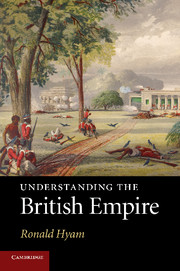Book contents
- Frontmatter
- Contents
- List of plates
- List of figures
- List of maps
- List of tables
- Preface
- Acknowledgements
- List of abbreviations
- Introduction: perspectives, policies, and people
- I Dynamics: geopolitics and economics
- II Ethics and religion
- 5 Peter Peckard, ‘universal benevolence’, and the abolition of the slave trade
- 6 The view from below: the African response to missionaries
- III Bureaucracy and policy-making
- IV Great men
- V Sexuality
- VI Imperial historians
- Published writings of RH on imperial history
- Index
6 - The view from below: the African response to missionaries
Published online by Cambridge University Press: 05 August 2012
- Frontmatter
- Contents
- List of plates
- List of figures
- List of maps
- List of tables
- Preface
- Acknowledgements
- List of abbreviations
- Introduction: perspectives, policies, and people
- I Dynamics: geopolitics and economics
- II Ethics and religion
- 5 Peter Peckard, ‘universal benevolence’, and the abolition of the slave trade
- 6 The view from below: the African response to missionaries
- III Bureaucracy and policy-making
- IV Great men
- V Sexuality
- VI Imperial historians
- Published writings of RH on imperial history
- Index
Summary
[In 1969 I spent five weeks with the two Mirfield Fathers of the Community of the Resurrection at the USPG Mission at Usutu in Swaziland. I was impressed with the extraordinary range of activities required of them. Part of the Diocese of Zululand and Swaziland, they had to be fluent in Zulu. They ran not only a parish church but a large and important boys' secondary school, together with outlying primary schools, for which they acted as governors and inspectors and occasionally as teachers. They had to be not merely pastors, but farm proprietors; they had to make medical diagnoses, employing and supervising nurses for peripatetic clinics; they acted as amateur architects and building suppliers for any new mission churches in the bush. They trained indigenous auxiliary clergy, led a scout troop, and generally dispensed advice of all kinds. I gained a fascinating insight into cultural interaction. Shortly afterwards I wrote as follows: ‘When a British missionary abandons his Volkswagen or Datsun, strips naked, balances his ordinary clothing, his priestly vestments and communion plate upon his head, and takes horrible risks by wading across a bilharzia-riddled river in flood, and returns to carry across his Swazi acolyte who cannot swim and is not tall enough to wade – all in order to celebrate the Eucharist in Zulu with a few Africans in a hut in a remote kraal – is not a meaningful interaction taking place which deserves at least some decent and sympathetic acknowledgement in the historical record?’ […]
- Type
- Chapter
- Information
- Understanding the British Empire , pp. 178 - 208Publisher: Cambridge University PressPrint publication year: 2010



